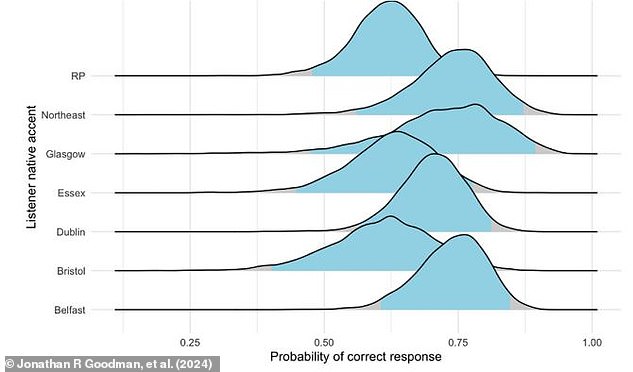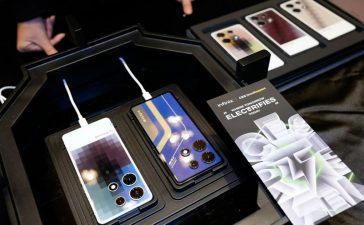From the broad Scottish brogue to the unmistakable Geordie twang, the UK is home to a bewilderingly diverse array of different accents.
But while you might pride yourself on your knowledge of local dialects, scientists have found that some British accents are simply more elusive than others.
Researchers from the University of Cambridge tested people from around the UK to see how reliably they could separate an imposter accent from the real deal.
Belfast, Geordie, and Glaswegian accents proved the hardest to forge, with locals able to spot a fraud up to 80 per cent of the time from just two seconds of audio.
Meanwhile, locals from London, Essex, and Bristol were the easiest to dupe, with fake accents passing as real almost half the time.
The researchers say that accent-detecting skills could be a defence mechanism which evolved to help sniff out outsiders.
This could explain why places like Belfast and Dublin which have frequently clashed with neighbours are home to some of the UK’s best accent cheat detectors.
So, do you think you could do any better? Take the test for yourself to find out.

Researchers from the University of Cambridge have found that Belfast, Geordie, and Glaswegian accents are the hardest to fake. Bristolian, Essex, and London accents on the other hand were the easiest
The researchers recruited 50 participants from the North East of England, Belfast, Dublin, Bristol, Glasgow, Essex and London to prepare audio samples for the trial.
Each participant was asked to read a series of random sentences, both in their natural voice and with their best impression of each of the other accents.
The clips you hear in the video are actual examples from the study, which were sent to 12,000 participants around the UK.
Just as you can now, each participant was asked to listen to a selection of clips and make a judgement as to whether they thought the accent was real or not.
Unsurprisingly, people tended to perform significantly better when they spoke the accent being mimicked and much worse when it wasn’t their own natural accent.
However, the researchers were surprised to find that there were big differences in how easily each accent could be faked.
The UK’s best accent cheat-detectors can be found in Glasgow where participants spotted fake Scottish accents with an accuracy ranging between 66 to 85 per cent.
In a close second place came the North East of England where Geordies like Ant and Dec detected imposters between 56 and 84 per cent of the time.

Participants were asked to listen to recordings of people speaking in their natural accents or doing impersonations of other UK accents. People were significantly better at guessing which was which when they naturally spoke in the accent being impersonated

Overall the researchers found Irish, Scottish, and the North East of England to have the hardest accents to fake. The researchers argue this is because
Meanwhile, Belfast locals like Jamie Dornan were able to spot the difference between a real or a fake Irish accent between 68 and 83 per cent of the time.
Likewise, while Dublin natives such as Barry Keoghan were quite bad at spotting impersonators in general, they managed to achieve an accuracy rate of up to 80 per cent for fake Irish accents.
On the other hand, people from London, Essex and Bristol were significantly worse at detecting imposters.
In all three locations, some people were only right just over 50 per cent of the time – meaning they were hardly more successful than guessing at random.
The worst performers of all were in London where even the best accent detectors could only spot fake ‘received pronunciation’, or standard British English, 67 per cent of the time.
Interestingly, these areas also showed smaller differences in success rates between clips when the speaker was imitating their own accent or another.
Lead author Dr Jonathan Goodman believes that these differences stem from differences in feelings about cultural identity.
Dr Goodman told MailOnline: ‘An accent is a representation of someone’s social identity and that’s something that is really ingrained in us.

Glaswegian proved to be the hardest accent to fake as locals like Peter Capaldi (pictured) were able to spot an imposter up to 85 per cent of the time

People from Belfast like Jamie Dornan were able to tell when someone was trying to impersonate their accent with an accuracy between 68 and 83 per cent
‘From the first few seconds of interacting with a person, we’re making all kinds of judgements about them based entirely on the phonemes [sounds in a language] that they are using.’
Since accents are such an integral part of how we view ourselves and those around us, in places where there is more emphasis on local identity, people start to pay more attention to how other people sound.
For example, studies have shown that people’s accents actually become stronger when they want to demarcate themselves for cultural reasons.
Even something as simple as the intrusion of tourists in the summer can trigger the local accent to become thicker as the community makes it clear who is an outsider.
Dr Goodman suggests that places like Belfast, Dublin, Glasgow and the North East have such good accent detectors because they have historically been in conflict with the South of England and London.
For someone growing up in Dublin during times of cultural tension, this means they will not only display their own accent more strongly but also be on the lookout for anyone who might be an imposter.
‘The thinking is that when you have greater cultural boundaries between two groups you are likely to get greater differentiation of accents between them, to delineate who has what background,’ Dr Goodman says.
‘Insofar as there is conflict, our prediction is that people would be more attuned to those kinds of signals of social identity.’

The areas with the best accent cheat detectors often had the biggest difference in success rate between when they spoke the accent being used (blue) and when they didn’t (red). The researchers argue this is because of a stronger sense of cultural identity

In the multicultural environment of London, natives of the capital like Naomi Campbell are much worse at detecting accents because there is less emphasis on spotting outsiders
On the flip side, this theory would also explain why people from metropolitan London are so bad at spotting a fake accent.
‘You’re around people with a greater amount of diversity on a day-to-day basis so there might be less emphasis on detecting outsiders,’ Dr Goodman says.
However, Dr Goodman believes that differences in accents are only the tip of a very large cultural iceberg.
In reality, whether or not we are vigilantly listening for fake accents comes down to how ready we are to trust someone.
Dr Goodman concludes: ‘How humans learn to trust another person who may be an interloper has been incredibly important over our evolutionary history and it remains critical today.
‘This is really about is our social evolution that led us to be very discerning about the signals we’re receiving from other people.’












